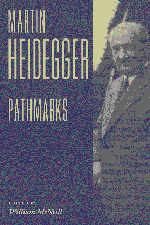Book contents
- Frontmatter
- Dedication
- Contents
- Editor's Preface
- Preface to the German Edition
- Comments on Karl Jaspers's Psychology of Worldviews (1919/21)
- Phenomenology and Theology (1927)
- From the Last Marburg Lecture Course (1928)
- What Is Metaphysics? (1929)
- On the Essence of Ground (1929)
- On the Essence of Truth (1930)
- Plato's Doctrine of Truth (1931/32, 1940)
- On the Essence and Concept of Φύσιζ in Aristotle's Physics B, I (1939)
- Postscript to “What Is Metaphysics?” (1943)
- Letter on “Humanism” (1946)
- Introduction to “What Is Metaphysics?” (1949)
- On the Question of Being (1955)
- Hegel and the Greeks (1958)
- Kant's Thesis about Being (1961)
- Notes
- References
- Editor's Postscript to the German Edition
On the Question of Being (1955)
- Frontmatter
- Dedication
- Contents
- Editor's Preface
- Preface to the German Edition
- Comments on Karl Jaspers's Psychology of Worldviews (1919/21)
- Phenomenology and Theology (1927)
- From the Last Marburg Lecture Course (1928)
- What Is Metaphysics? (1929)
- On the Essence of Ground (1929)
- On the Essence of Truth (1930)
- Plato's Doctrine of Truth (1931/32, 1940)
- On the Essence and Concept of Φύσιζ in Aristotle's Physics B, I (1939)
- Postscript to “What Is Metaphysics?” (1943)
- Letter on “Humanism” (1946)
- Introduction to “What Is Metaphysics?” (1949)
- On the Question of Being (1955)
- Hegel and the Greeks (1958)
- Kant's Thesis about Being (1961)
- Notes
- References
- Editor's Postscript to the German Edition
Summary
FOREWORD
[213] This essay presents the unaltered, slightly expanded (pp. 24ff.) text of a contribution to a publication in honor of Ernst Jünger (1955). The title has been altered. It formerly read: Concerning “The Line” [Über “Die Linie”]. The new title is meant to indicate that the meditation on the essence of nihilism stems from a discussion [Erörterung] locating being as being. In accordance with the tradition, philosophy understands the question of being as the question concerning beings as beings. This is the question of metaphysics. The answers to this question in each case appeal to an interpretation of being that remains unquestioned and that prepares the ground and soil for metaphysics. Metaphysics does not go back into its ground. Such a return is addressed in the “Introduction to ‘What Is Metaphysics?’,” which since the fifth edition (1949) has been placed before the text of the lecture (seventh edition [1955], pp. 7–23).
CONCERNING “THE LINE”
Dear Herr Jünger!
My greeting on your sixtieth birthday adopts, with a slight change, the title of the treatise that you dedicated to me on the same occasion. Your contribution Across the Line [Über die Linie) has meanwhile appeared as a separate publication, expanded in a few places. It is an “assessment of our situation,” concerned with “crossing” the line, yet does not confine itself merely to describing the situation.
- Type
- Chapter
- Information
- Pathmarks , pp. 291 - 322Publisher: Cambridge University PressPrint publication year: 1998
- 2
- Cited by



